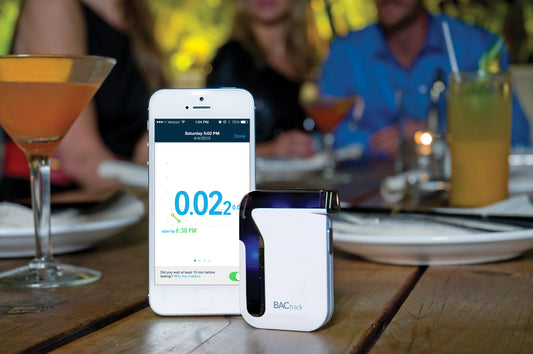What is BAC?
What is BAC?
Blood Alcohol Content (BAC) describes the percentage of alcohol present in the blood. BAC testing enables law enforcement and medical professionals--as well as concerned individuals--to objectively estimate the level of a person’s alcohol intoxication. Put simply, the higher the BAC number, the greater the impairment.
Know Your BAC’s
Alcohol rapidly absorbs into the bloodstream through the walls of the stomach and the small intestine, and travels throughout the body and brain. Your BAC can be measured shortly after you consume your first drink – in just 15 minutes.
In the US, you are considered legally intoxicated if your BAC level is 0.08% or greater -- but you can still be convicted of a DUI offense if your BAC is below 0.08%.
Individuals with the same BAC may experience different degrees of impairment. Variables that affect BAC include gender, body weight, time spent drinking, and the amount of food consumed.
BAC is usually determined by one of three tests: breath, urine, or blood. Blood testing is generally regarded as the most accurate method of estimating BAC, but requires a trained professional to draw blood, which can be painful, time consuming, and messy. Urine tests are considered the least accurate, and tend to be used only when other tests are not available.
Breath testing is the most convenient, easy, and painless method of estimating BAC. It is the most common test performed by law enforcement officials, who use handheld fuel cell sensor breathalyzers to conduct roadside tests. These tests are nearly as accurate as blood tests, and are considered admissible evidence in most court proceedings. The BACtrack Pro Series breathalyzers utilize this same fuel cell sensor technology and therefore deliver to the consumer the same level of accuracy used by the police.
Your BAC Tippling Point
BAC results are expressed as grams per deciliter (g/dl) of blood, and readings are usually displayed in decimals, such as 0.07. This means that for every 700 drops of blood, the body contains at least one drop of alcohol.
BACtrack Professional Grade Breathalyzers utilize the same fuel cell sensor technology used by law enforcement, and therefore deliver to the consumer the same level of accuracy.
In the United States, you are considered to be legally intoxicated and prohibited from driving a vehicle if your BAC level is 0.08% or greater. But even if your BAC is below 0.08%, you can still be convicted of a DUI offense. Intoxication begins with the very first drink. Use a BACtrack breathalyzer to learn how alcohol affects your body and your BAC. Know where you stand before you make a decision you might regret.




